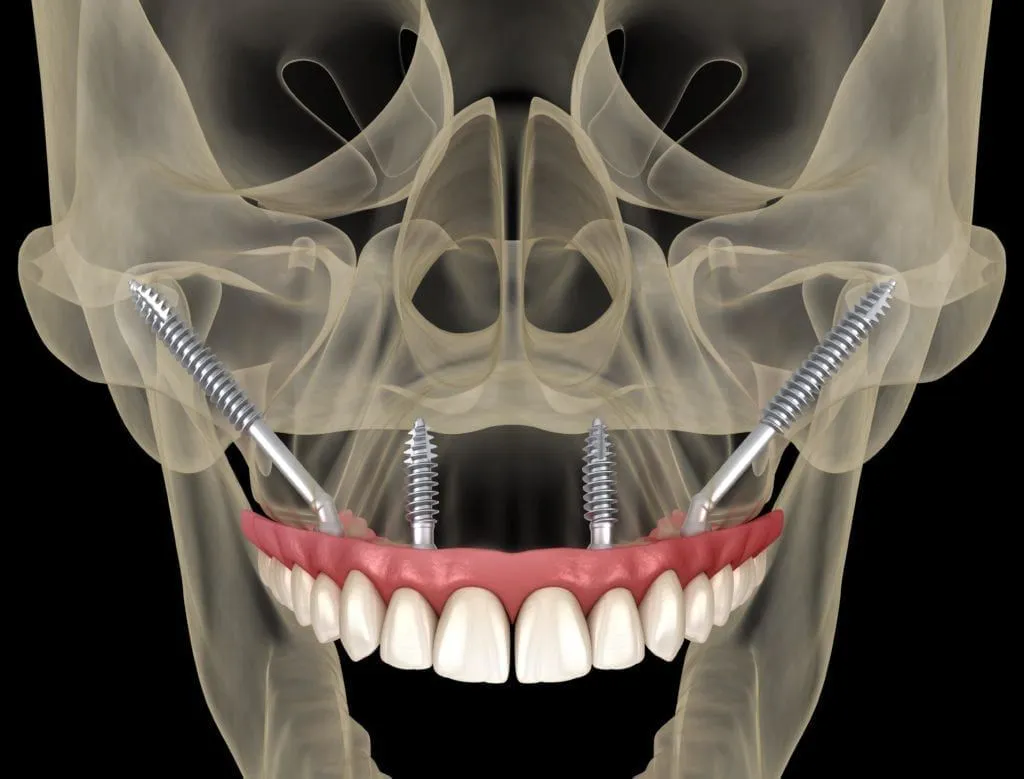Zygomatic Implants

Patients who want dental implants but have extensive bone loss in the upper jaw can benefit from zygomatic (Zygoma) implants. This procedure eliminates the need for bone grafting (bone augmentation). Unlike traditional "root-form" dental implants, which are placed in the jaws to replace teeth, these implants are inserted into the zygomatic bone (cheekbone) to support upper jaw (maxillary) teeth, bridges, and dentures.
What Are Zygomatic Implants?
Zygoma implants are placed in to the zygomatic bone (cheek bone), which would be denser than the upper jaw. This strong foundation for implant stability distributes stress across a large region, allowing for the successful rapid installation of dental bridges during surgery (no need to use a denture or go without teeth for any period). These implants have been used safely and successfully since the late 1980s.
Zygomatic implants commonly called "Zygoma," traverse into the deficient area of your upper jaw to attach to the bottom of the cheekbones through your sinuses and are an alternative to bone grafting procedures in the upper jaw. These implants are put into the back area of your jaw from within your mouth and can be coupled with one or more standard (root form) implants in the front part of your jaw.
Depending on the requirement of the patients, either two (one on each side) or four (two on each side) implants are put into place to support full or partial dental bridges.
When conducted by a professional surgeon with knowledge of the method, the treatment is safe and predictable. The surgery is a day-stay surgery under anesthesia, and a complete set of teeth can be attached to the implants on the same day of surgery.
What are some of the advantages of zygomatic implants?
Zygomatic implants restore patients' self-confidence by improving the appearance and aesthetics of their smiles; they also ensure a return to enjoying social outings and interactions as a result of the better oral function (speech, eating, and swallowing) associated with fixed dental bridges.
Apart from improved speech, eating, and swallowing, appearance, and low maintenance of teeth, there are other benefits of zygomatic implants. These include:
- Bone grafting is rarely needed.
- This treatment is suitable for patients with severe bone loss.
- Dental bridges are attached to the implants on the same day as surgery.
- Zygomatic implants have a role in providing dental support to cleft lip and palate patients who are unable to tolerate more conventional treatments.
- One zygomatic implant can support 3-4 teeth; one regular dental implant supports 1-2 teeth.
- Four zygomatic implants can support a full upper dental bridge.
- Zygomatic implants can be used to salvage other failed or failing dental implant treatments (All on 4; mini-implants; failed bone grafts; severe periodontal breakdown of the existing teeth).
Do you want to learn more about the benefits and drawbacks of zygomatic implant surgery? Contact the experts at Manoj Dental Care today.
Call Us Now or For More Information Click Here